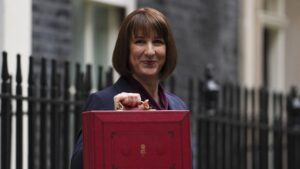State pension to rise by more than £400 a year in April – double some winter fuel payments
It’s because of public sector pay rises that the pension is going to go up to such a degree, the ONS suggests.

The state pension is due to rise by 4% in April, giving an extra £460 a year to recipients.
The payment increases by the highest of total average weekly earnings, inflation for September or 2.5%.
How much will pension payments rise?
Figures on Tuesday showed average weekly earnings rose by 4% in the three months to July.
Inflation data for September has not yet been published but stood at 2.2% for July, according to the Office for National Statistics (ONS).
Money blog: Will White Maltesers return to UK shops?
It means the weekly pension payment will rise from the current £221.20 a week to £230.05 a week. From April, when the payment rises, pensioners will get an extra £8.85 a week, equivalent to a top-up of £460 per year.
Last year pensioners got a rise of 8.5%.
This year’s pension increase comes with the government under pressure after scrapping the winter fuel allowance for most pensioners. The annual rise in pension payments is more than double the allowance for some, worth either £200 or £300.
Why are wages going up?
Public sector pay rises may be behind part of the growth, the ONS said.
“Growth in total pay slowed markedly again as one-off payments made to many public sector workers in June and July last year continue to affect the figures,” said the ONS director of economic statistics Liz McKeown.

Keep up with all the latest news from the UK and around the world by following Sky News
Also released on Tuesday was data on unemployment, which eased to 4.1% from 4.2%. At the same time, however, the number of jobs available fell across every industry, the ONS said.
Despite this, the number of jobs on offer remains above pandemic levels.
Wages had been growing even higher in the past months, the 4% rise is down from 4.1% a month earlier and from a high of 8.3% a year earlier.
Be the first to get Breaking News
Install the Sky News app for free


What does it mean for interest rates?
High wage rises had been a concern for the interest rate-setters at the Bank of England as they battled to bring down inflation through more expensive borrowing.
A continued fall will be welcomed by the Bank but is unlikely to push it to cut the rate from 5% when it meets next week.
Current market expectations are for the interest rate to be held.


